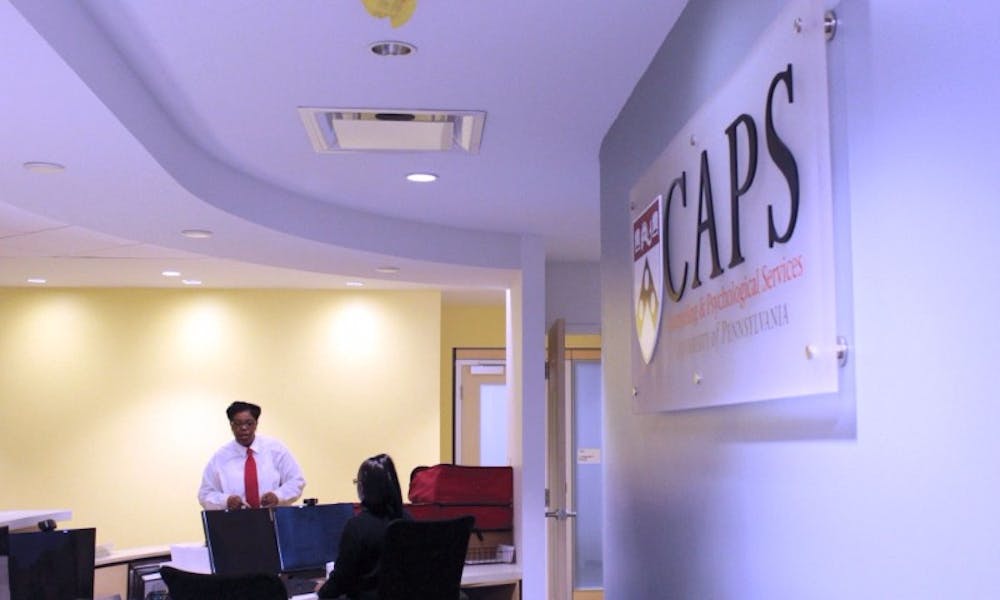
Counseling and Psychological Services announced the hiring of four new CAPS staff members approximately a year ago. Since then, the four CAPS employees, each directly serving one of four graduate schools, have been integrated into the schools and are working toward some noticeable progress.
The newest full-time employees are assigned to serve four of the graduate schools — the Law School, the Perelman School of Medicine, the School of Veterinary Medicine, and the School of Dental Medicine — for six-to-10 hours a week.
Each therapist works out of a private office in a building associated with one of the four schools and they generally work from 3 to 7 p.m., so as not to conflict with the graduate students' daily schedules.
“It is the best time for all of these schools, where students may be working 8-5,” CAPS Director of Outreach and Prevention Services Meeta Kumar said. “Many of them don’t live on campus and for them to come back later can be restrictive.”
According to Graduate and Professional School Assembly President Miles Owen, a third-year Design and School of Arts and Sciences professional master's student, the use of CAPS' services by graduate students has increased from 12 percent in the 2016-2017 academic year to more than 17 percent for the current year. He added that the utilization in the Dental School alone has nearly doubled over the course of the last year.
While graduate students from any of the University's 12 schools are able to use general CAPS resources as well as the four special staffers, CAPS is still in the process of expanding resources for all graduate students. Owen cited issues with space as one of the issues facing expansion of resources.
"Confidentiality is a big issue. It’s one of the obstacles of CAPS expanding to other schools because there just aren’t facilities for CAPS to see students with privacy," Owen said. "It makes it difficult sometimes for CAPS to do outreach in all the different graduate schools."
These numbers, however, include any registered contact, not necessarily continued treatment. Although the staff can perform on-site therapy, they are not meant to be long-term solutions and usually refer graduate students to CAPS or outside providers, according to Kumar.
“It’s an enhancement of the larger CAPS team,” Kumar said. “They are primarily meant to increase access to CAPS. We try to move students to network providers as soon as they can. For professional students sometimes, it’s more appropriate that they see a private practitioner in the community.”
The first employee was installed in the School of Veterinary Medicine in 2015, and the skyrocket in student use led CAPS to introduce staff to the Dental School the next year, and then Law and Medicine this past year.
CAPS’ increased accessibility was especially necessary due to the decentralized nature of graduate schools, Owen said.
“They’ve been doing a good job with increased presence and ability to reach and screen for people who may need their services,” fourth-year dental student Matthew Breglio said.
Kumar said one of CAPS’ goals while hiring the new staff was to reflect the diversity of the student body in their faculty.
“I think the more minority intersectional identities we can have, we expand our reach and make it more welcoming for students to seek services here,” she said. “We are able to expand our cultural competence and be able to serve unique needs.”
Students find job pressures, time management, workload, financial security, and feelings of isolation to be the primary sources of stress of graduate school.
A faculty member of Penn's Critical Writing Program Julia McWilliams, who received her Ph.D. in cultural anthropology and urban housing from Penn in 2017 and started at the Graduate School of Education in 2011, said that although she found that graduate school to be “extremely isolating” and that she “definitely dealt with some anxiety" during her time as a student, “the conversation was largely about undergraduate student health.”
Ignoring mental health issues can at times take a toll on students’ performance, Breglio said.
“It’s even more taboo to talk [mental health] in the professional area because it’s assumed that we’ve already achieved so much, we’re in this program, we know what we want to do, we’re older, we should know how to handle stressors,” Breglio added. “Sometimes I think it can be stigmatized even more with us.”
“The people who have an academic struggle, more often than not, struggle because they have a personal issue running with them,” he added.
The Daily Pennsylvanian is an independent, student-run newspaper. Please consider making a donation to support the coverage that shapes the University. Your generosity ensures a future of strong journalism at Penn.
Donate







